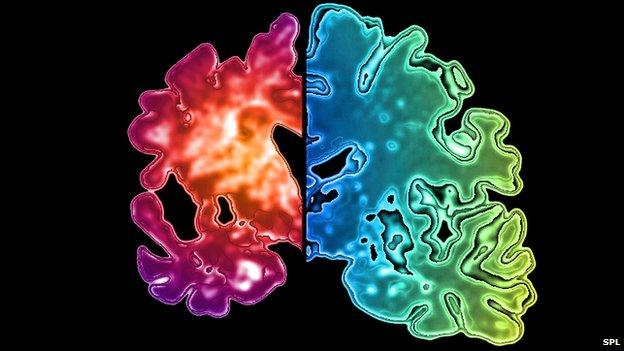The drug to slow Alzheimer's?
- Published

Loss of tissue in a demented brain compared with a healthy one
Talk to anyone affected by Alzheimer's and the need for a drug to slow the progression of the disease is clear.
Jeremy Cox is looking after his wife Roz who has been diagnosed with dementia.
"I think one of the things you've got to be aware of is, without a drug like this, what the situation is, it's desperate.
"You just go on into the final stage of being spoon-fed baby-food in a care home."
The statistics back up the human stories too.
Alzheimer's Research UK estimates that a treatment that could slow dementia progression by 25% would halve the number of people who reach the most debilitating severe form of the disease.
At the moment there is simply nothing to stop that happening.
Current medication, such as Aricept, can manage only the symptoms of dementia by helping the dying brain cells function.
First hint

The findings so far suggest this drug could buy time for patients
The modern history of dementia research has been unbelievably bleak. More than 100 trials in the past three decades have produced just a handful of drugs that manage symptoms and nothing to stop the death of the brain.
Compare that to the phenomenal progress that had been made in heart disease or cancer.
That is why even the slightest hint of progress - for those in the mildest stage of Alzheimer's - is creating excitement.
Provisional data suggests that the drug solanezumab may slow the progression of the disease by 34%.
The implication is that the amount of cognitive decline normally seen in 18 months would take 24 months with the drug - allowing patients to spend longer in the mild phase of the degenerative disease.
Be in no doubt that it would be a hugely significant moment if such as drug was available.
However, today is not the day to jump up and down proclaiming a breakthrough in slowing the pace of Alzheimer's.
The limited data which has been released is the scientific equivalent of a poll before a general election or a trailer ahead of a movie.
It provides captivating clues, hints and teases, but nothing definitive.
Next year, when further trial results are due, we will know for certain whether solanezumab is the breakthrough everyone hopes it could be.
But even if everything goes perfectly it could take years to reach patients as the drug is licensed and approved.
It means people with Alzheimer's today are unlikely to benefit as the effect is seen only in those with the mildest stage of the disease.
- Published22 July 2015
